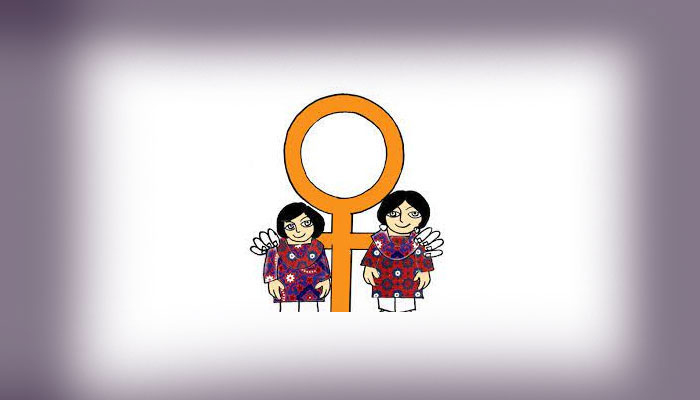Peasant women most vulnerable in Sindh, webinar told
Speakers at a webinar said on Saturday the landless peasants and agricultural workers were not the centre of any of the relevant policies in the country, particularly in the Sindh province.
The Hari Welfare Association (HWA), a peasant rights body, organised the webinar to mark International Peasants Rights Day.
Nuzhat Shireen, chairperson of the Sindh Commission on the Status of Women (SCSW), said that peasant women did not have access to information about their registration under the Sindh Agriculture Workers Act of 2019, nor did they know how to unionise and be able to access food and livelihoods resources.
“Due to lack of literacy among rural women, women are neither able to read laws about their rights nor can they maintain records of their financial transactions with landlords,” she said.
She urged the Sindh government to distribute land among landless peasant women. “The government’s previous project of distributing land among landless peasants was not successful mainly because the land was not given to women.”
The SCSW chairperson asserted that peasant women could get their basic rights if they formed their unions under the Sindh Industrial Relations Act or the Sindh Agriculture Workers Act of 2019. She added that peasant and rural women did not have access to funds.
Akram Ali Khaskheli, HWA’s president, said that food sovereignty was the fundamental right of everyone, including peasants. “It means that peasants have the right to define their own agricultural and fishing policies, management of land, water resources, seeds, and bio-diversity,” he said.
He lamented that federal laws such as the Seed (Amendment) Act in 2015 and the Plant Breeders Act in 2016 posed threats to the traditional heritage and structure built on the foundations of free exchange of seeds and knowledge among peasant communities. Moreover, the Plant Breeders Act of 2016 added to the problems created by the Seed Act of 2015, he said.
Shabnam Baloch, a development expert who is associated with the International Trade Centre, said that food sovereignty was a serious issue in Sindh, but there is no food sovereignty for peasants who grow and cultivate foods”.
She said laws were available to protect the peasants’ rights but were not implemented. “Food sovereignty could come through land ownership, but around 80 per cent of agricultural land is under the control of only five per cent of families in Sindh,” Baloch said. She also said that poor peasants did not know about agriculture input funds, and some did not know how to obtain these.
Abid Niaz Khan, National Project Coordinator of the International Labour Organisation’s EU-funded Trade for Decent Work Project, highlighted that the ILO’s C011-Right of Association (Agriculture) Convention, 1921 (No. 11), was ratified by the British government in 1923.
“The motivation to do so would probably have been drawn from Article VI of the convention which required the member states to apply the ratification to their colonies at that time. Pakistan after becoming a member of ILO in 1947, inherited this ratification,” he said.
He said haris and peasants had multiple legal protections-their human rights, tenancy rights, labour rights, economic and social rights were protected and they thus had multiple layers of protection, which unfortunately were not translating into practicality.
Ismail Kunbhar, a professor from the Sindh Agriculture University, Tandojam, said Sindh’s peasants and workers produced abundant food, including wheat, sugar and rice, but they did not receive it for their survival. “Their food sovereignty does not exist. The migrant workers, especially women from the Tharparkar region, move to other districts of Sindh where they pick chilies, cotton, mangoes and watermelon, but they are not paid decent wages,” he said.
Kunbhar said the landless peasant project of the government did not bring positive results to peasants because many of them did not have access to water and their lands were yet un-identifiable even allocated by the government.
Zulfiqar Shah, joint director of the Pakistan Institute of Labour Education and Research (PILER), said that, unfortunately, there was a sheer dearth of rights’ struggle by peasants although NGOs were working in their individual capacity but a collective voice and struggle did not exist.
He lamented that due to such a gap, peasants’ real issues, including slavery and debt bondage, had become silent. He said that it was the duty of the government to ensure that those who cultivated land for food and cotton should have enough to eat and wear.
Rafia Gulani, a women rights activist, said women workers and peasants suffered the most during the natural calamities, and landlords were compensated for the loss, but peasants were never compensated for the loss in floods and rains.
“Women picking chilies and cotton do not have basic health services, and they suffer the most.”
She urged that all women in agriculture should be provided with social security and organised under the SIRA and the Sindh Agriculture Worker Women Act,” she said.
Pirbhu Satyani, Iqbal Detho (a member of the NCRC), Ali Hassan Mahar, and others also spoke.
-
 Why Ariana Grande Wants A 'tiny Mouse' To Play Her In Biopic?
Why Ariana Grande Wants A 'tiny Mouse' To Play Her In Biopic? -
 Wind Chill Returns With Brutal Cold As Polar Vortex Stalls Over Canada
Wind Chill Returns With Brutal Cold As Polar Vortex Stalls Over Canada -
 Costco $20 Rule Explained As Employee Pay Climbs Across North America
Costco $20 Rule Explained As Employee Pay Climbs Across North America -
 Strange Incident Happened At Nancy Guthrie's Home On Abduction's 10th Day
Strange Incident Happened At Nancy Guthrie's Home On Abduction's 10th Day -
 Tumbler Ridge School Lockdown Underway As RCMP Investigate School Shooting
Tumbler Ridge School Lockdown Underway As RCMP Investigate School Shooting -
 Britney Spears Quietly Parts Ways With Her Music Catalog: Report
Britney Spears Quietly Parts Ways With Her Music Catalog: Report -
 Princess Diana Bodyguard Suspected ‘she Could Die’: Here’s How
Princess Diana Bodyguard Suspected ‘she Could Die’: Here’s How -
 Teddi Mellencamp Marks Huge Milestone With Emotional Message Amid Cancer
Teddi Mellencamp Marks Huge Milestone With Emotional Message Amid Cancer -
 King Charles Makes It ‘absolutely Clear’ He Wants To Solve Royal Crisis
King Charles Makes It ‘absolutely Clear’ He Wants To Solve Royal Crisis -
 Kylie Jenner Looks Back With 'grace' On Early Fame Years: 'Just Being Myself'
Kylie Jenner Looks Back With 'grace' On Early Fame Years: 'Just Being Myself' -
 Royal Family Warned To ‘have Answers’ Amid Weak Standing
Royal Family Warned To ‘have Answers’ Amid Weak Standing -
 Marc Anthony On Why Bad Bunny’s Super Bowl Show Mattered
Marc Anthony On Why Bad Bunny’s Super Bowl Show Mattered -
 Kid Rock Gets Honest About Bad Bunny’s Performance At Super Bowl
Kid Rock Gets Honest About Bad Bunny’s Performance At Super Bowl -
 Kylie Jenner Reveals Real Story Behind Her 'The Moment' Casting
Kylie Jenner Reveals Real Story Behind Her 'The Moment' Casting -
 Jaafar Jackson Breaks Silence On Becoming Michael Jackson
Jaafar Jackson Breaks Silence On Becoming Michael Jackson -
 Eva Mendes Admits She Was Jealous Of Ryan Gosling’s CGI ‘girlfriend’ Rocky
Eva Mendes Admits She Was Jealous Of Ryan Gosling’s CGI ‘girlfriend’ Rocky




